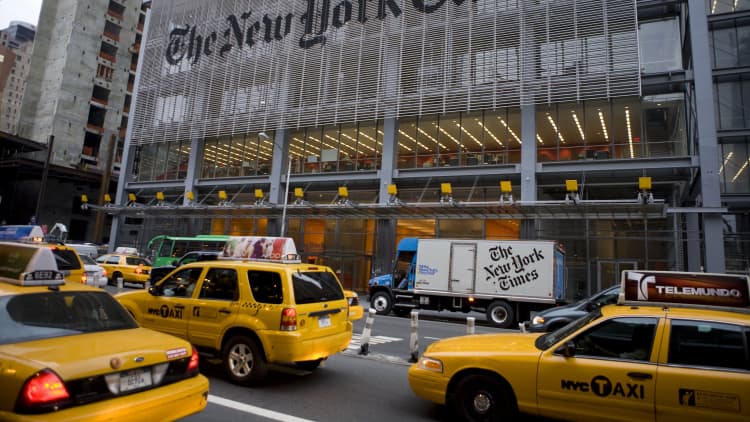
President Donald Trump revealed on Sunday that he met secretly with A.G. Sulzberger, the publisher of The New York Times, sparking a new clash as both men disputed the events of the meeting.
On Twitter early in the day, Trump called the interaction "very good and interesting," but that description was disputed by Sulzberger himself in a statement.
Trump has a long-running feud with the media in general, with the Times being a frequent target of his ire. While the president did not state when he met with Sulzberger, he tweeted that the two parties discussed "the vast amounts of fake news, and how that Fake News has morphed into phrase, 'Enemy of the People.'"
Yet in a lengthy rebuttal, the Times released a statement from Sulzberger that offered the publisher's own characterization of what he discussed with Trump. Sulzberger said he expressed concern about Trump's "deeply troubling anti-press rhetoric," and that it was "eroding" the U.S. commitment to free speech and an unrestrained press.
Later on Sunday, Trump blasted the Times and The Washington Post in a new series of furious tweets, denouncing both publications as "anti-Trump haters" who are "do nothing but write bad stories even on very positive achievements — they will never change!"
Below is the full test of Sulzberger's statement:
My main purpose for accepting the meeting was to raise concerns about the president's deeply troubling anti-press rhetoric. I told the president directly that I thought that his language was not just divisive but increasingly dangerous. I told him that although the phrase "fake news" is untrue and harmful, I am far more concerned about his labeling journalists "the enemy of the people."
I warned that this inflammatory language is contributing to a rise in threats against journalists and will lead to violence. I repeatedly stressed that this is particularly true abroad, where the president's rhetoric is being used by some regimes to justify sweeping crackdowns on journalists.
I warned that it was putting lives at risk, that it was undermining the democratic ideals of our nation, and that it was eroding one of our country's greatest exports: a commitment to free speech and a free press.
Throughout the conversation I emphasized that if President Trump, like previous presidents, was upset with coverage of his administration he was of course free to tell the world. I made clear repeatedly that I was not asking for him to soften his attacks on The Times if he felt our coverage was unfair. Instead, I implored him to reconsider his broader attacks on journalism, which I believe are dangerous and harmful to our country.
--The Associated Press contributed to this article.


